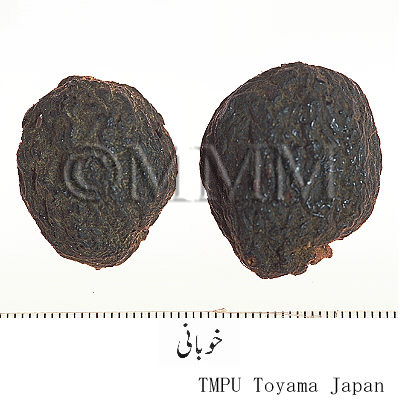Crude drug sample data base
※Click on the image to enlarge it.
The capital city, provincial capital city or the representative
location of its administrative area is indicated.
location of its administrative area is indicated.
Production area information
https://ethmed.toyama-wakan.net/img/pin_san.png
23.810332
90.41251809999994
Collection information
People's Republic of Bangladesh,Dacca [Dhaka]
https://ethmed.toyama-wakan.net/img/pin_nyu.png
Scientific information data base
| Crude drug name | Urudu name, English name | Khubani, Apricot | ||
|---|---|---|---|---|
| Arabic name / Persian name | Mishmish / Khubani, Khurmani, Zardalu | |||
| crude drug image |
| |||
| Original plant name | Prunus armeniaca Linn. | |||
| Family name | Rosaceae | |||
| Used part | Fruits (dried) | |||
| Distribution area | Native of Asia, now cultivated in Kashmir, Kumaon and Himachal Pradesh in India. It also occurs in Baluchistan and Afghanistan. | |||
| Description | The fresh fruit of apricot is of the size of walnut and rounded like a peach. On drying the fruit turns brownish and sweet in taste. The kernel is smaller than almonds and sweetish in taste like the sweet almond. Choice. The best variety of apricot is the Armenian variety which does not readily decay or become sour. The type of humour produced by it is quickly putrefied. | |||
| Function and properties | Food, Stomach, Fevers, Excretion. Nutrient, tonic, demulcent (laxative), antibilious (for heat and fevers), antipyretic (of bilious origin), resolvent and antiflatulent. | |||
| Specific actions | Antibilious and demulcent. | |||
| Frequency in use | Common. | |||
| Common uses | Food: Its infusion quenches thirst. It is comparatively more suitable than peach for stomach ailments. Cold tempered persons should take it with pure honey. Stomach: Apricot relieves obstructions from the digestive system, acts as demulcent, laxative and refrigerant and included in syrups used as general tonic. Its use lessens the blood heat, helps alleviation of gastritis and stomach irritation. Fevers: The infusion of dried apricot is, however, useful in acute fevers. Excretion: The oil of its kernels is useful in piles. | |||
| Side effect | It may induce fevers because of its tendency towards rapid putrefaction. Unripe fresh fruit may cause flatulence. It is advised by the traditional physicians to take them before meals. Apricots have been referred to be antidote to hill sickness. | |||
| Medical system | Unani | |||
| Traditional concept | Temperament | The fruit is cold and moist in the second degree. The kernel is hot and moist in the first degree. The oil (of kernels) is hot and dry in the second degree (Avicenna). | ||
| Drug effect | It is an antibilious and demulcent. | |||
| Comments | Oil is used for cooking. | |||
| Dosage | 5 to 10 (pieces). | |||
| Substitute | Shaftalu (Prunus persica (L.) Batsch), peaches. | |||
| Corrigent (corrective) | Sugar; Mastagi (Pistacia lentiscus Linn.) and Anisun (Pimpinella anisum Linn.). | |||
| Important compound preparations | Khuban. | |||
| References | Reference book Tips! | Illustrated Manual of Herbal Drugs Used in Ayurveda, 1996. Sarin, Y.K., Council of Scientific & Industrial Research and Indian Council of Medical Research, New Delhi p 204. Makhzanul-Mufradat (Khawasul Adviyah), Hakeem Kabiruddin, Daftar Al-Masih, Qarol Bagh, Delhi. pp 274-275. A Survey of Drugs, 1961 (2nd edi.). Wahid, A. K. and Siddiqui, H. H. Institute of History of Medicine and Medical Research, Delhi. pp 37-44. Dictionary of Economic Plants in India, 1996 (2nd Rep.). Singh, U; Wadhwani, A. M. and Johri B.M. Indian council of Agricultural Research, New Delhi. p 184. Al-Qanun Fil-Tibb. Avicenna. (English translation of the critical Arabic text), Book 2, 1998. Hameed, H. A. (editor), Dept. of Islamic Studies, Jamia Hamdard (Hamdard University), New Delhi. p 438. Indusyunic Medicine, 1997. Usmanghani, K., Saeed, A. and Alam, M. T. Department of Pharmacognosy, Faculty of Pharmacy, University of Karachi, Karachi. pp 360-361. | ||
| Remarks | All Unani physicians have described this drug. No controversy is reported and there is no problem of adulteration. It is mentioned by Avicenna (Ibn Sina) in his ''Canon of Medicine''. | |||
| Last renewal date | 2024/02/27 | |||


